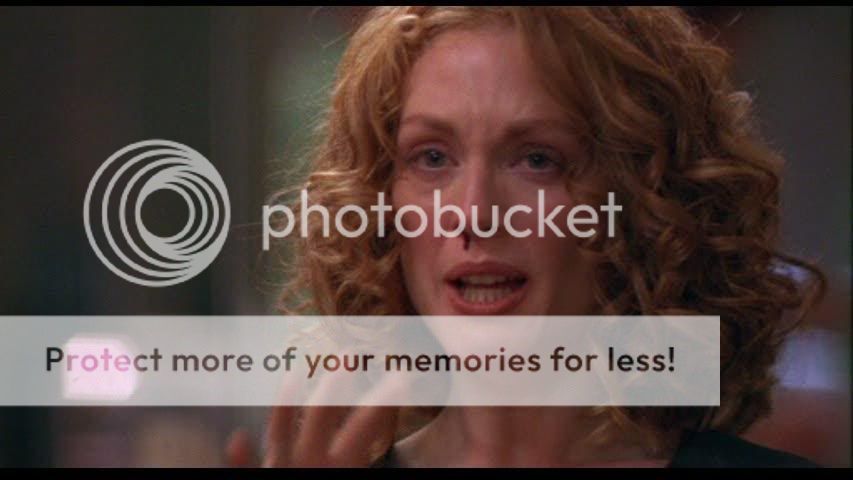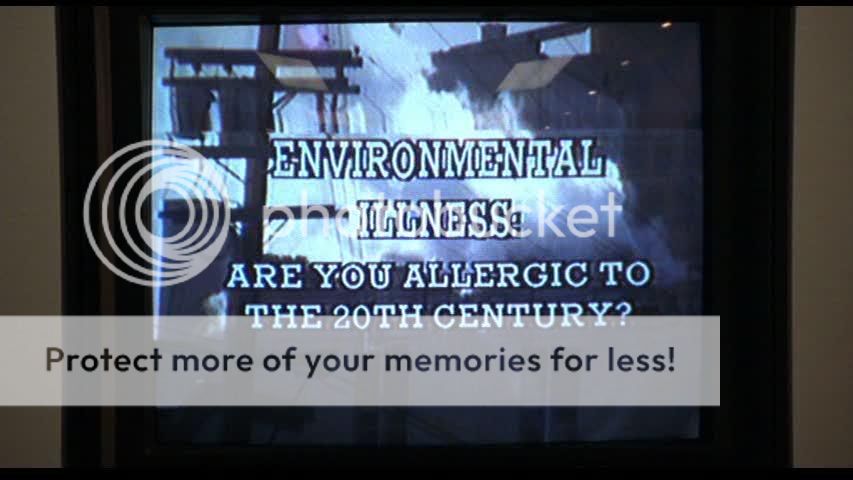 Todd Haynes' Safe is a creepy, oblique horror movie about the horror of the "normal" life. It's a horror film in which there is no creeping monster behind the sedate suburban façade, no locus of evil that preys on the frazzled housewife Carol (Julianne Moore). The suburbs themselves are the source of the horror here: the ornately empty houses, the bored chatter of housewives with no real interests and nothing to talk about, the antiseptic routines of daily life, the lack of connections even to her own family. For the gay Haynes, straight existence itself is terrifying, a hellish, deadened nothingness with few escape routes. The first half of this film, in which Carol is isolated within her own palatial home as though stumbling in a narcotic daze, is a kind of warm-up for the pastel-colored Sirkian mise en scène of Haynes' Far From Heaven, in which he channeled Sirk's brightly colored vision of suburban Americana and the social ills lurking underneath. Safe is more oblique than both Sirk himself and than Haynes' later Sirk pastiche. There's something chilly and suffocating about this film, in the weirdly distanced interiors, so carefully set-decorated and lit, their precise geometric contours and patterned colors isolating Carol within a space where nothing betrays a hint of life or motion or vitality. Haynes' camera simply sits at a distance, observing stoically as this ordinary woman comes apart at the seams, becoming convinced that her very environment is trying to poison her.
Todd Haynes' Safe is a creepy, oblique horror movie about the horror of the "normal" life. It's a horror film in which there is no creeping monster behind the sedate suburban façade, no locus of evil that preys on the frazzled housewife Carol (Julianne Moore). The suburbs themselves are the source of the horror here: the ornately empty houses, the bored chatter of housewives with no real interests and nothing to talk about, the antiseptic routines of daily life, the lack of connections even to her own family. For the gay Haynes, straight existence itself is terrifying, a hellish, deadened nothingness with few escape routes. The first half of this film, in which Carol is isolated within her own palatial home as though stumbling in a narcotic daze, is a kind of warm-up for the pastel-colored Sirkian mise en scène of Haynes' Far From Heaven, in which he channeled Sirk's brightly colored vision of suburban Americana and the social ills lurking underneath. Safe is more oblique than both Sirk himself and than Haynes' later Sirk pastiche. There's something chilly and suffocating about this film, in the weirdly distanced interiors, so carefully set-decorated and lit, their precise geometric contours and patterned colors isolating Carol within a space where nothing betrays a hint of life or motion or vitality. Haynes' camera simply sits at a distance, observing stoically as this ordinary woman comes apart at the seams, becoming convinced that her very environment is trying to poison her.The second half of the film largely abandons this stylized suburban crypt as Carol checks herself into a New Agey treatment facility that deals with amorphous illnesses caused by environmental factors. There, the urbanely sinister guru Peter Dunning (Peter Friedman) dispenses a variety of arcane "cures" and self-help advice to his patients. Haynes is not-so-subtly mocking the various charlatans and hippie commune-type facilities that exist on the fringes of this kind of Californian lifestyle, and especially the empty promises and rhetoric of so-called AIDS "cures." Carol, fleeing from the monotony of her zombified home life, winds up somewhere even worse, alienated even from her family, truly alone. By the film's end, she's locking herself up in a containment chamber where she can retreat from the world and try to come to terms with whatever her mysterious illness might be. With its halved structure, Safe asks whether the cure might sometimes be worse than the disease, or whether there is really any escape from the kind of soul-numbing existence depicted here, the deep existential emptiness that Carol feels eating away at her from within.


















14 comments:
Safe is a film that I enjoyed very much when it came out - I've not re-watched it since.
I always remember it's sterile, Kubrick-esque look.
Excellent review! This is one of the scariest movies I've ever seen. The scene in which she has a coughing fit in the car has always stuck with me for some reason, though I haven't watched the film in years.
"With its halved structure, Safe asks whether the cure might sometimes be worse than the disease, or whether there is really any escape from the kind of soul-numbing existence depicted here, the deep existential emptiness that Carol feels eating away at her from within."
Yes, beautifuly stated, as is the remainder of this superb capsule. It's certainly a worthy entry to your top-etchelon grouping, although I rate FAR FROM HEAVEN as an even greater film in Haynes's canon. But that's a matter of taste of course, nothing more. This film, and his recent I'M NOT THERE border on the masterpiece label for sure. Of course my favorite passage in this essay is this, which poses the comparsion most eloquently:
"The first half of this film, in which Carol is isolated within her own palatial home as though stumbling in a narcotic daze, is a kind of warm-up for the pastel-colored Sirkian mise en scène of Haynes' Far From Heaven, in which he channeled Sirk's brightly colored vision of suburban Americana and the social ills lurking underneath. Safe is more oblique than both Sirk himself and than Haynes' later Sirk pastiche."
Haynes and Lynch are thematically connected.
Great photos, but that's a given here.
Safe is a hard film to come to terms with, as its themes are not simple, nor is its filmmaker without ambivalence toward them. I look at Antonioni, who seems an obvious influence here, and realize that he's really quite easy to understand in comparison. How does Haynes feel about Carol? She seems like a victim, certainly in the first part of the film. But she's also cruel, apparently abandoning her family for nothing, really; her husband seems more sympathetic in the second half as he tries to understand what she is doing.
Carol is completely hollow, dead inside, and attaches her own ennui to her environment because that's all she has. We as an audience think it really can be pollution (and given recent cases of extreme latex sensitivity, it's not at all far-fetched), yet her ready acceptance of a diagnosis of self-loathing shows she has no clue what her problem is.
I know this film is partially an allegory for AIDS and the charlatan "doctors" desperate people clung to - Haynes says so himself. But I read more than a condemnation of these snake-oil salesmen. I read Carol as a stand-in gay man trying to find his identity in a society in which he can no longer bury himself, as someone who has to be taught not to hate himself. It's really a very powerful, enigmatic film.
Thanks for the comments all. I agree with Alex that this is a genuinely scary film, though its terror is amorphous.
Sam, I like pretty much everything Haynes has done to one degree or another. I think this is probably his best film, followed by I'm Not There (and my love of Dylan doesn't hurt there) but Far From Heaven is certainly great as well. Good point about Lynch, too; both directors are concerned with the terrible things lurking inside suburban tranquility.
Marilyn, like you I'm impressed by the film's challenging ambiguity; it's hard to know what to think when confronted with Haynes' startling vision. And it works as a metaphor, not only for AIDS and AIDS cures, but as you point out, as a more general metaphor for gay alienation, or suburban alienation, or the disconnection of a modern life in which things matter more than people, or any number of other related themes. Haynes maintains such distance here that his perspective is very hard to get a handle on.
Ed -
Just want to chime in with everyone else and tell you this is a fine post.
"Safe" is a film that has haunted me for years. I love how Haynes makes those suburban interiors - and thier inhabitants feel so sinister and other wordly. Even though I've never understood exactly what it was about, I've always just felt drawn to its weird, alienated vibe.
Julianne Moore's performance is a marvel to me. As Marilyn noted, her character isn't necessarily sympathetic, but Moore is mesmerizing in every scene. She just seems completely devoid of any sense of herself whatsoever. In the commune scenes especially, she has such a weird, compelling detachment - she's going through the motions, but it never feels like she is a true believer.
Wow this is crazy Ed.
First I want to say that I just found your blog last week while searching for writings on Rivette's le Pont du Nord (which I enjoyed immensely and which you wrote a great piece on), and quickly found myself drawn to your Films I Love section. Needless to say I was like a kid in a candy store, seeing some of my all time favorite films listed along with so many promising titles I've never heard of.
Anyway not just a handful of hours ago I was discussing with a friend the films we would love to see eventually get a Criterion treatment and the first one out of my mouth was the very film you've selected here, my favorite Todd Haynes film Safe. Obviously refreshing your site just now I was taken aback that you picked this.
Truly one of the most haunting films I've ever seen. How Julianne Moore did not win every acting award given that year is one of the great crimes of the 90's as far as I'm concerned. Haynes is incredibly gifted and has a wonderful visual touch as you've described so well, and while I've enjoyed all of his films like you to varying degrees, Safe stands tall above the others for me in terms of raw impact and sheer visual aesthetics. It boggles my mind how he is able to create and build such an ominous and desolate undercurrent frame after frame. A true masterpiece of horror and a Great film.
Keep up the great work!
And to compound the injustice of Ms. Moore not winning for SAFE we have the even more outrageous slight for FAR FROM HEAVEN, which is arguably her greatest performance of all. Oddly enough the New York Film Critics Circle awarded FAR FROM HEAVEN and Todd Haynes (and Patricia Clarkson) their top prizes in 2002, but opted to give the Best Actress peize to Diane Lane. But Moore won virtually every other award, save for the Oscar that went to Nicole Kidman for THE HOURS.
Pat, you're right that Moore's performance is amazing, in a role that requires her to avoid conventional emotional and psychological acting. Her character really does seem disconnected from everything around her, aimless and confused, unable even to understand what she wants out of life or why she's so unhappy. She's so empty, and yet Moore manages to invest this character with real depth even though we don't fully understand or like her.
DMac, thanks for the kind words, I'm really glad you're enjoying the site. Safe was my introduction to Haynes, and as you suggest, I was blown away by its intensity, and its unpredictability: just when I started to get a handle on the film's first half, it switches gears almost completely.
Safe is a scariest movie. This movie is one of the excellent product for cinema industry. It has most of the scenes which are common in day to day life.
Ed
For some reason I missed this review as I search the web after my viewing of SAFE a few weeks back. Yet again, you so perfectly encapsulated everything that's great about this movie, especially the structure and relationship to FAR FROM HEAVEN and Sirk.
On first blush, I liked Haynes' take on the first half more, whereas I took the second half at face value -- is Moore really getting sick from toxins and fumes, or is she simply running away from a life she can't stand.
Yet, your point that the second half is there to make us think about if the cure is worse than the disease is so much better (and it's a little maddening that I didn't see it that way on my initial viewing, another case of me not seeing the forest for the trees). I'm now having to re-evaluate the movie as a whole. Just an outstanding job, as always, Ed.
Thanks, Troy. I have to say, there are few movies that are so ambiguous in their intent, so resolute in their refusal to determine one overarching interpretation. As I said above, in response to Marilyn, this film can really be about any number of different things which overlap to one degree or another: AIDs, suburban alienation, being gay in a dominant straight culture, the lack of purpose in a lifestyle defined in the shallow terms by which Carol lives. Haynes treats everything at such a chilly distance that it's hard to know what he's thinking or what he's after, and I think it's this ambiguity that makes the film so interesting, and makes its final closeup of Carol so haunting.
I've been reading all you wrote about Todd Haynes for a while (here and on Slant Magazine). I've never found such interesting writings about Haynes, very inspiring.
Safe was the Haynes still missing on my shelf (Mildred Pierce will be my date for tonight). I watched it yesterday, and first thing I did this morning was re-reading your article. Can't agree more with you.
A truly underrated film, such a deep analysis of the psychological illness within the 20th century. Everything comes so natural, so moving, so plain and still so surprising. Great, great stuff.
Thanks, Gekko. Haynes is one of my favorite modern filmmakers, and Safe is, I think, one of his best, a film that's really unlike anything else out there. I'm sure you'll enjoy Mildred Pierce, too, it's quite good, and I'm really happy that Haynes was somehow able to make such an ambitious and uncommercial work for TV like that.
Post a Comment